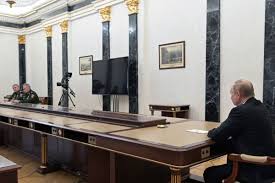This is not a Covid-related distance. It's a power-related distance.
 |
| Putin, reminding his underlings they are underlings. (Apologies for the low res.) |
What does this photo tell you about the person behind the desk in this outsized space? I guess that dictators, like all autocratic rulers, kings, tsars, caliphs, sect leaders, et.al. need to distinguish themselves from the rest of us, emphasize a difference, a majesty if that is at all possible. Especially if they're a bit short (viz: Napoleon).
I remember that the people we talked with when we were there (we had hired Russian guides for a few days as Ken and I were there on our own) were either cynical or pessimistic. Or wanted to leave. No one came across as an optimist or–even less likely–an idealist. A Putin suppporter summed up his feelings about Putin in a word: stability. He was a proud admirer of his country's history.
I know this was small sample of opinion, but telling.
But what can one make of the sheer weirdness of the Putin photos below? These are meant to be intimate meetings, one with Putin's chief military advisors, people he knows well, and, presumably, trusts. The photos are comical. There's something about the meglomania that seems to afflict those whose power is absolute, and grows ever more elaborate, eventually reaching almost cartoonish proportions. The death of Stalin in 1953 had distinctly comical aspects, monster though he was. The actual history cries out for satire, as in the 2017 film The Death of Stalin, with Michael Palin and Steve Buscemi, among others. Comical as it was, it is based on some pretty strange history. Start with the fact that Stalin's rule was based on fear, a fear that permeated all levels. Days before he died he had imprisoned the nation's leading doctors all of whom were accused of plotting against him, and they were awaiting trial and–very likely, execution. So there was no doctor in attendance when Stalin suffered a stroke (or heart attack) at his dacha. Everyone was afraid to act. What might happen to them if things, anything, went awry? No one trusted anyone else.
Such a history.
 |
The next thing to wonder might be why the Russian people appear to accept this kind of leadership. Obviously they rejected it when they threw out the monarchy in 1918. But what was it they accepted–or settled for– instead? What role model is available? I recall that anywhere there was a statue of Lenin fresh roses had been laid at its base. This was also the case of statues of the poet Pushkin whose verses a guide could recite at will. Are they equally revered? At whose feet would I lay roses?
We have seen only too often how once people believe in something, or someone, it becomes almost like a religious belief, held firm, impervious to reason. There have recently been many series on television about people who have conned someone, both in business (We Work, the Theranos scandal in The Dropout, etc.) and personally (all too often stories of women who thought they fell for someone who ended up stealing from them and taking over their minds), and that belief becomes the very devil to erase. It may be that erasing the thing you believe in is like erasing a part of yourself, admitting that a part of you has been invalidated. No one likes to be invalidated. No one enjoys being wrong. Your own history is the only one you have. There is great resistance here, for example, for white people, for anyone, to admit to having any racist beliefs, to holding any stock in white supremacy. Change is humbling.
Autocrats are not humble. How much better the whole world would be with a dose of humility.
But who am I to say?
*Sergei Einsenstein directed and co-wrote the classic silent film "Battleship Potemkin" which dramatizes the mutiny aboard the battleship Potemkin in 1905, a historic moment in the start of the Russian revolution. It is also known for an unforgettable sequence showing the populace fleeing down the steps at Odessa.


